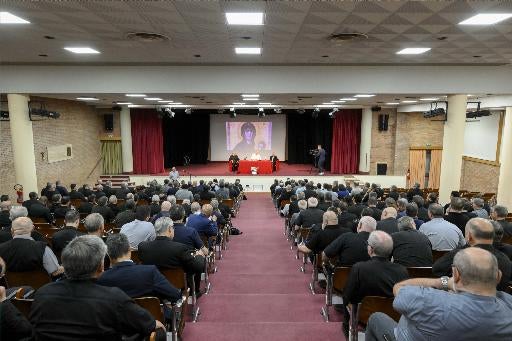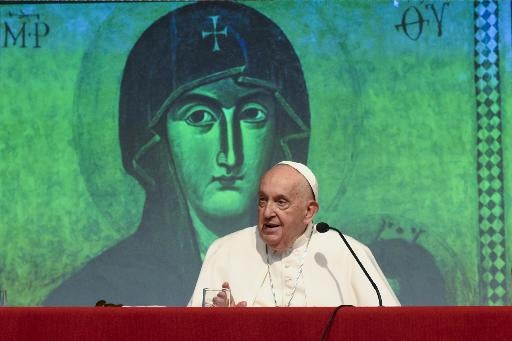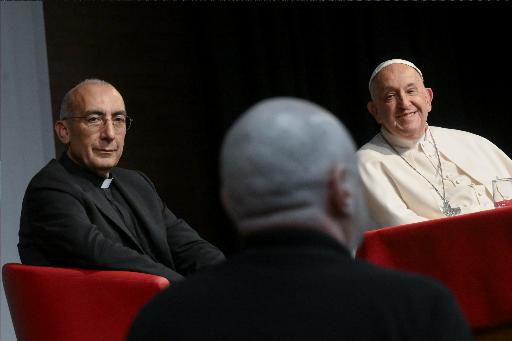Pope encourages priests to reach out to those who are ‘invisible’
ROME (CNS) — Pope Francis encouraged priests to seek out those who are “invisible” in society and he warned against “ideologies” in the church.
According to Italian news reports, one of the ideologies he specified was a gay culture, referring to it, however, by using the same derogatory slang term in Italian that he reportedly used in a closed-door meeting with members of the Italian bishops’ conference in May when describing some seminaries as being marked by a gay culture.
During a closed-door meeting June 11 with about 160 priests from the Diocese of Rome at the Pontifical Salesian University, the pope said it would not be prudent to admit young men with homosexual tendencies to seminaries as candidates for the priesthood, according to the Italian news agencies, ANSA and Adnkronos, citing unnamed individuals who attended the meeting with the pope.
These young men are “good kids,” but they will encounter difficulties that will then show up in the exercise of their ministry, the pope said, sources told the two agencies.
The pope was not condemning gay people, and he reiterated that the church is open to everyone, ANSA reported.
What he was warning against was a kind of “lobby” that turns a homosexual lifestyle into an ideology, sources told Adnkronos. ANSA reported sources said the pope used the derogatory term when talking about the Vatican, saying that “in the Vatican there is an air of” a gay culture, and that it is not easy to guard against this trend.
The meeting at the Salesian University included priests ordained 11-39 years ago, and it was the third and last of a series of meetings with clergy from the Diocese of Rome. The pope met May 14 with some 70 priests who have been ordained 40 years or more, and he met May 29 with priests ordained 10 years or less.
The Vatican press office said the pope “spoke about the danger of ideologies in the church and returned to the issue of the admission into seminaries of people with homosexual tendencies, reiterating the need to welcome and accompany them in the church and the prudential recommendation of the Dicastery for the Clergy regarding their admission to a seminary.”
Among the many issues discussed during the question-and-answer dialogue with priests, the press office said, was the need for parishes to expand their welcome “to everyone, everyone, everyone!”
In response to comments about addressing people’s suffering, the pope said people should be accompanied with closeness, compassion and tenderness, which are three qualities of God.
The importance of pastoral care in hospitals and the difficulties of life in the city of Rome, such as the housing crisis, the spread of drugs and loneliness, were also discussed, the press office said.
“Our job as priests is to go and look for these people” who are “invisible” in society because “the church is either prophetic or it is clerical: it is up to us to choose,” he said.
Responding to the housing crisis, the pope invited religious congregations that own buildings and facilities to be generous, the press hall said. According to ANSA, the pope had been criticizing religious who, despite their vow of poverty, are focused on making money and are speculating on rent prices with the upcoming Jubilee.
Assets are for the community and not for speculation, the pope reportedly said, according to ANSA.
According to the Vatican press office, the dialogue between the pope and priests also touched on the tragedy of the wars underway and the huge amounts of money nations spend on weapons and birth control and that individuals spend on veterinary care and cosmetic surgery.
For this reason, more should be done to promote the church’s social teachings, the common good and peace, the pope said.
The pope thanked the priests for their work and urged them to continue to listen to all those who turn to them and to engage in community discernment.
Rome Auxiliary Bishop Michele Di Tolve, who was present at the meeting, told Vatican News that the pope invited priests “to be strong and meek at the same time, to let the parish feel close to people, like a home among homes and where they can relive an experience of being a family.”


